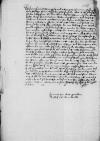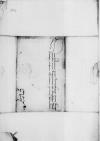Das E(wer) E(rbarkei)t fleisig sunder ablassenn / bei dem hernn Andrzej Zebrzydowski (*1496 – †1560), pupil and householder of Erasmus of Rotterdam; 1530(?) dean at the collegiate chapter in Łęczyca; 1530 Cracow canon; 1531 - Płock; 1532 scholastic at the collegiate chapter in Warsaw; 1538 Poznań canon; 1543 bishop of Kamieniec; 1545 - Chełm; 1546 - Włocławek; 1551 - Cracow; chaplain of queen Bona Sforza; 1543 royal envoy to Roman King Ferdinand von Habsburg; 1549 - to Queen of Hungary Isabela Zápolya (Wy, 272)⌊leslauschennAndrzej Zebrzydowski (*1496 – †1560), pupil and householder of Erasmus of Rotterdam; 1530(?) dean at the collegiate chapter in Łęczyca; 1530 Cracow canon; 1531 - Płock; 1532 scholastic at the collegiate chapter in Warsaw; 1538 Poznań canon; 1543 bishop of Kamieniec; 1545 - Chełm; 1546 - Włocławek; 1551 - Cracow; chaplain of queen Bona Sforza; 1543 royal envoy to Roman King Ferdinand von Habsburg; 1549 - to Queen of Hungary Isabela Zápolya (Wy, 272)⌋ / auf der Ioannes Dantiscus (Johannes von Höfen, Ioannes de Curiis, Jan Dantyszek, Johannes Flachsbinder) (*1485 – †1548), eminent diplomat and humanist in the service of the Jagiellons, neo-Latin poet; 1530-1537 Bishop of Kulm; 1537-1548 Bishop of Ermland
Tiedemann Giese (Tidemannus Gisius) (*1480 – †1550), in 1519 ennobled by King Sigismund I; 1504-1538 Canon of Ermland (Warmia); 1516-1527, 1533-1537 Judicial Vicar and Vicar General of Ermland; 1523-1538 Custos of Ermland; 1537-1549 Bishop of Kulm (Chełmno); 1549-1550 Bishop of Ermland (BORAWSKA 1984, passim)
Stanisław Kostka (*1487 – †1555), as a leader of the so-called nobles' party active in Royal Prussia since 1536, Kostka stood in opposition to most of the members of the Council of Royal Prussia, who wanted to maintain the autonomy of the province and a "balance of power" in terms of governance. The tension between the Prussian Subtreasurer and the Council had been increasing since the Diet in Graudenz (Grudziądz) in 1533. Kostka, connected with the royal court since his youth, was sent to Graudenz as the King's deputy and, contrary to custom, decided to take part in the proceedings. In response to such a step, the Council members stopped the meeting. Kostka accused them of hostility towards the Poles and intervened on this matter at the court. In the absence of the then Bishop of Ermland (Mauritius Ferber) it was Dantiscus who chaired the Graudenz Diet. The incident badly harmed his future relationships with Kostka; 1531-1555 Treasurer of the Prussian lands and Treasurer of Marienburg (Malbork); 1544-1545 Castellan of Elbing (Elbląg), 1545-1546 Castellan of Kulm (Chełmno); 1546-1549 Vice-Voivode of Kulm; 1546-1551 Voivode of Pomerania; 1551-1555 Voivode of Kulm (PSB 14, p. 356; Urzędnicy 5/2, p. 216; MAŁŁEK 1976, p. 119-123)⌊hernn redteIoannes Dantiscus (Johannes von Höfen, Ioannes de Curiis, Jan Dantyszek, Johannes Flachsbinder) (*1485 – †1548), eminent diplomat and humanist in the service of the Jagiellons, neo-Latin poet; 1530-1537 Bishop of Kulm; 1537-1548 Bishop of Ermland
Tiedemann Giese (Tidemannus Gisius) (*1480 – †1550), in 1519 ennobled by King Sigismund I; 1504-1538 Canon of Ermland (Warmia); 1516-1527, 1533-1537 Judicial Vicar and Vicar General of Ermland; 1523-1538 Custos of Ermland; 1537-1549 Bishop of Kulm (Chełmno); 1549-1550 Bishop of Ermland (BORAWSKA 1984, passim)
Stanisław Kostka (*1487 – †1555), as a leader of the so-called nobles' party active in Royal Prussia since 1536, Kostka stood in opposition to most of the members of the Council of Royal Prussia, who wanted to maintain the autonomy of the province and a "balance of power" in terms of governance. The tension between the Prussian Subtreasurer and the Council had been increasing since the Diet in Graudenz (Grudziądz) in 1533. Kostka, connected with the royal court since his youth, was sent to Graudenz as the King's deputy and, contrary to custom, decided to take part in the proceedings. In response to such a step, the Council members stopped the meeting. Kostka accused them of hostility towards the Poles and intervened on this matter at the court. In the absence of the then Bishop of Ermland (Mauritius Ferber) it was Dantiscus who chaired the Graudenz Diet. The incident badly harmed his future relationships with Kostka; 1531-1555 Treasurer of the Prussian lands and Treasurer of Marienburg (Malbork); 1544-1545 Castellan of Elbing (Elbląg), 1545-1546 Castellan of Kulm (Chełmno); 1546-1549 Vice-Voivode of Kulm; 1546-1551 Voivode of Pomerania; 1551-1555 Voivode of Kulm (PSB 14, p. 356; Urzędnicy 5/2, p. 216; MAŁŁEK 1976, p. 119-123)⌋ cf. Ioannes DANTISCUS, Tiedemann GIESE & Stanisław KOSTKA to Andrzej ZEBRZYDOWSKI 1546-10-19 or shortly before, CIDTC IDL 7419, letter lost⌊briefcf. Ioannes DANTISCUS, Tiedemann GIESE & Stanisław KOSTKA to Andrzej ZEBRZYDOWSKI 1546-10-19 or shortly before, CIDTC IDL 7419, letter lost⌋ zuantwortenn / haben angehaltenn / und letzlich auch ein cf. Andrzej ZEBRZYDOWSKI to Ioannes DANTISCUS, Tiedemann GIESE & Stanisław KOSTKA Subkowy, 1546-10-21, CIDTC IDL 3003⌊antwortcf. Andrzej ZEBRZYDOWSKI to Ioannes DANTISCUS, Tiedemann GIESE & Stanisław KOSTKA Subkowy, 1546-10-21, CIDTC IDL 3003⌋, / welches wir bei diesem E(wer) E(rbarkei)t cf. Gdańsk Town Council to Ioannes DANTISCUS & Tiedemann GIESE Gdańsk (Danzig), 1546-10-22, CIDTC IDL 4656⌊schreibencf. Gdańsk Town Council to Ioannes DANTISCUS & Tiedemann GIESE Gdańsk (Danzig), 1546-10-22, CIDTC IDL 4656⌋ boko(m)men, / erhaltenn, / ist von E(wer) E(rbarkei)t nicht allein wol bedocht wordenn, / sunder auch sher nutzlich, / den wir dadurch seiner liebden gemut erfharenn / und die ursachenn, worum die closter eingenomen worden, erkundigt, / welche den viel anders lautenn, / den die uns zuvor seindt zuko(m)men / und angegebenn. Schickenn darum E(wer) E(rbarkei)t auf dersulbtenn bit / hiebei gelegt die abschrift gedochts hernn Andrzej Zebrzydowski (*1496 – †1560), pupil and householder of Erasmus of Rotterdam; 1530(?) dean at the collegiate chapter in Łęczyca; 1530 Cracow canon; 1531 - Płock; 1532 scholastic at the collegiate chapter in Warsaw; 1538 Poznań canon; 1543 bishop of Kamieniec; 1545 - Chełm; 1546 - Włocławek; 1551 - Cracow; chaplain of queen Bona Sforza; 1543 royal envoy to Roman King Ferdinand von Habsburg; 1549 - to Queen of Hungary Isabela Zápolya (Wy, 272)⌊bischofsAndrzej Zebrzydowski (*1496 – †1560), pupil and householder of Erasmus of Rotterdam; 1530(?) dean at the collegiate chapter in Łęczyca; 1530 Cracow canon; 1531 - Płock; 1532 scholastic at the collegiate chapter in Warsaw; 1538 Poznań canon; 1543 bishop of Kamieniec; 1545 - Chełm; 1546 - Włocławek; 1551 - Cracow; chaplain of queen Bona Sforza; 1543 royal envoy to Roman King Ferdinand von Habsburg; 1549 - to Queen of Hungary Isabela Zápolya (Wy, 272)⌋ cf. Andrzej ZEBRZYDOWSKI to Ioannes DANTISCUS, Tiedemann GIESE & Stanisław KOSTKA Subkowy, 1546-10-21, CIDTC IDL 3003⌊antwurtscf. Andrzej ZEBRZYDOWSKI to Ioannes DANTISCUS, Tiedemann GIESE & Stanisław KOSTKA Subkowy, 1546-10-21, CIDTC IDL 3003⌋. Und dieweil darin vormeldet, das in dem Carthusian convent in Kartuzy ⌊cartheuser closterCarthusian convent in Kartuzy ⌋ / nicht mher, dan drei bruder gewesenn, / do wir doch erstlich von czhenn / und darnoch von vierczhenn, / die man alda gefunden hette, / seindt berichtet wordenn, / bittenn wir freuntlich, E(wer) E(rbarkei)t wolten sich nicht beswerenn, / sunderlich so ihnen das closter nahent gelegenn / und uns, wie viel bruder man alda gefunden und gewesenn seindt, / a written over u⌈uaa written over u⌉uch sunst wie es damit allenthalben ein meinung habe, / grundtlichenn berichtenn. Den wo dem so were, / das da nicht mher, dan drei bruder gewesenn, / duncket uns nicht gerathenn sein, / das man der Council of Royal Prussia the most important local authority in Royal Prussia. It consisted of two bishops (of Ermland (Warmia), who served as the Council’s president, and of Kulm (Chełmno)), three voivodes (of Kulm, Marienburg (Malbork), and Pomerania), three castellans (of Kulm, Elbing (Elbląg), and Gdańsk (Danzig)), three chamberlains (of Kulm, Marienburg, and Pomerania), and representatives of the three Great Prussian Cities – Gdańsk, Thorn (Toruń), and Elbing (ACHREMCZYK 2016, p. 17-18)⌊hernn redteCouncil of Royal Prussia the most important local authority in Royal Prussia. It consisted of two bishops (of Ermland (Warmia), who served as the Council’s president, and of Kulm (Chełmno)), three voivodes (of Kulm, Marienburg (Malbork), and Pomerania), three castellans (of Kulm, Elbing (Elbląg), and Gdańsk (Danzig)), three chamberlains (of Kulm, Marienburg, and Pomerania), and representatives of the three Great Prussian Cities – Gdańsk, Thorn (Toruń), and Elbing (ACHREMCZYK 2016, p. 17-18)⌋ brif, / davon wir in unserm negsten cf. Ioannes DANTISCUS to Gdańsk Town Council Heilsberg (Lidzbark Warmiński), 1546-10-24, CIDTC IDL 4456⌊schreibencf. Ioannes DANTISCUS to Gdańsk Town Council Heilsberg (Lidzbark Warmiński), 1546-10-24, CIDTC IDL 4456⌋ a written over v⌈vaa written over v⌉n E(wer) E(rbarkei)t gemeldet, / an Sigismund I Jagiellon (Zygmunt I) (*1467 – †1548), King of Poland and Grand Duke of Lithuania (1506-1548); Duke of Głogów (Glogau) (1499-1506), Duke of Opava (1501-1506), Governor of Silesia (1504-1506); son of King Kazimierz IV Jagiellon and Elisabeth of Austria⌊ko(nigliche) m(aieste)tSigismund I Jagiellon (Zygmunt I) (*1467 – †1548), King of Poland and Grand Duke of Lithuania (1506-1548); Duke of Głogów (Glogau) (1499-1506), Duke of Opava (1501-1506), Governor of Silesia (1504-1506); son of King Kazimierz IV Jagiellon and Elisabeth of Austria⌋ thete fertigenn, / sunder were besser, das der angehaltenn wurde / bass auf fernere und grundtliche erkundung, / damit wir nicht bei ko(niglicher) m(aieste)t antruffenn, worin uns E(wer) E(rbarkei)t, / die wir gotlichenn genadenn bovelenn, / ihr antwurt aufs erste und furderlichste / unbeswert wollen zuschreiben und wissenn lassenn.


 APG 300, 53, 269, p. 140
APG 300, 53, 269, p. 140